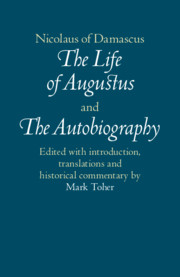 Nicolaus of Damascus: The Life of Augustus and The Autobiography
Nicolaus of Damascus: The Life of Augustus and The Autobiography Book contents
- Frontmatter
- Dedication
- Contents
- Preface
- Note on the Text
- Introduction
- TEXT AND TRANSLATION OF THE LIFE OF AUGUSTUS
- SIGLA
- NICOLAUS OF DAMASCUS: THE LIFE OF AUGUSTUS
- COMMENTARY
- TEXT AND TRANSLATION OF AUTOBIOGRAPHICAL EXCERPTS
- COMMENTARY
- References: Abbreviations
- Editions Of The Bios Kaisaros And Idios Bios
- General Index
- Index of Greek Words
NICOLAUS OF DAMASCUS: THE LIFE OF AUGUSTUS
from TEXT AND TRANSLATION OF THE LIFE OF AUGUSTUS
Published online by Cambridge University Press: 11 May 2017
- Frontmatter
- Dedication
- Contents
- Preface
- Note on the Text
- Introduction
- TEXT AND TRANSLATION OF THE LIFE OF AUGUSTUS
- SIGLA
- NICOLAUS OF DAMASCUS: THE LIFE OF AUGUSTUS
- COMMENTARY
- TEXT AND TRANSLATION OF AUTOBIOGRAPHICAL EXCERPTS
- COMMENTARY
- References: Abbreviations
- Editions Of The Bios Kaisaros And Idios Bios
- General Index
- Index of Greek Words
Summary
FROM THE SAME (AUTHOR) ON THE EARLY TRAINING OF CAESAR
Ex. I (J 125=M 99 I) (1) Men addressed him in this way out of respect for his high standing, and people spread over the islands and the mainland, distributed throughout their cities and nations, honor him with temples and sacrifices in accordance with the magnitude of his virtue and in return for his benefactions to them. After he attained the highest degree of power and prudence, this man ruled over the most people in the memory of men: he extended the boundary of Roman power to its farthest extent and not only placed the Greeks and foreign populations under the secure control of Rome but he also secured their dispositions. He did this at first by arms but afterwards even without arms as he persuaded them to voluntary obedience through the manifest demonstration of his benevolence. Of populations whose names men had never heard and which had never been subjugated in the memory of man, having pacified so many as live within the River Rhine as well as [those] beyond the Ionian Sea and the Illyrian peoples (they are called the Pannonians and the Dacians) * * * (Refer to [the section] “On Brave Deeds”)
Ex. II (J 126=M 99 II) (2) To recount the power of this man's wisdom and excellence, and how he managed the government at Rome and conducted great wars both domestic and foreign, presents a challenge for those men who would declaim and write about them so that they themselves would become distinguished through his noble deeds. However, I will relate his achievements so that it will be possible for everyone to know the truth. Before that, I will give an account of his lineage, character and ancestry, and of his rearing as a child and the training by which he became such a great man. (3) His father was Gaius Octavius, a man of the senatorial class. Octavius and his ancestors were very famous for their wealth and honesty, and this money was left to Octavius’ son when he was orphaned. The boy's appointed guardians squandered the money left to him, but he refrained from prosecuting them in court and managed with the money that remained.
- Type
- Chapter
- Information
- Nicolaus of Damascus: The Life of Augustus and The AutobiographyEdited with Introduction, Translations and Historical Commentary, pp. 68 - 152Publisher: Cambridge University PressPrint publication year: 2016


